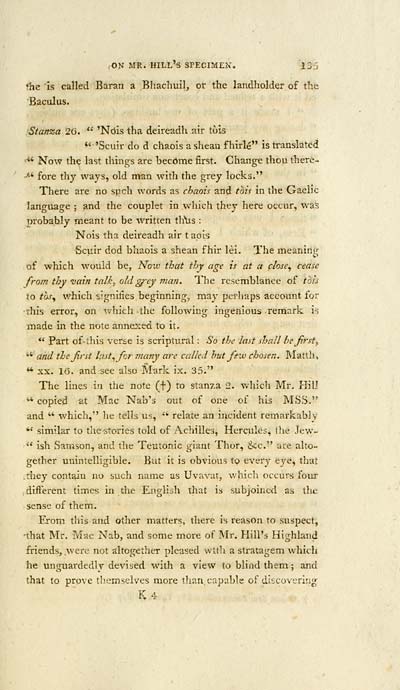Ossian Collection > Report of the Committee of the Highland Society of Scotland, appointed to inquire into the nature and authenticity of the poems of Ossian
(309)
Download files
Complete book:
Individual page:
Thumbnail gallery: Grid view | List view

ON MR. HILL'S SPECIMEN. 13 .
fhe is called Baran a Bhachuil, or the landholder of the
Baculus.
Stanza 20. " 'Ntìis tha deireadh air tuis
" 'Scuir do d chaois ashean fhirle" is translated
■" Now the last things are become first. Change thou there -
-" fore thy ways, old man with the grey locks."
There are no such words as chaois and this in the Gaelic
language ; and the couplet in which they here occur, was
nrobably meant to be written th v as :
Nois tha deireadh air tapis
Scuir dod bhaois a shean fhir lèi. The meaning
of which would be, Now that thy age is at a close, cease
from thy vain talk, old gfey man. The resemblance of this
to tbsy which signifies beginning, may perhaps account for
•rhis error, on which the following ingenious remark is
made in the note annexed to it.
" Part of -this verse is scriptural : So the last shall he first y
"^ and the first last , for many are called hut few chosen. Matth,
" xx. 16. and see also Mark ix. 35."
The lines in the note (f) to stanza 2. which Mr. Hill
" copied at Mac Nab's out of one of his MSS."
and M which," he tells us, " relate an incident remarkably
u similar to the stories told of /Vchille:», Hercules, the Jew-
" ish Samson, and the Teutonic giant Thor, &c." are alto-
gether unintelligible. But it is obvious to every eye, that
.they contain no such name as Uvavat, which occurs four
different times in the English that is subjoined as the
sense of them.
From this and other matters, there is reason to suspect,
-that Mr. Mac Nab, and some more of Mr. Hill's Highland
friends, were not altogether pleased wtth a stratagem which
he unguardedly devised with a view to blind them ; and
that to prove themselves more than, capable of discovering
K4
fhe is called Baran a Bhachuil, or the landholder of the
Baculus.
Stanza 20. " 'Ntìis tha deireadh air tuis
" 'Scuir do d chaois ashean fhirle" is translated
■" Now the last things are become first. Change thou there -
-" fore thy ways, old man with the grey locks."
There are no such words as chaois and this in the Gaelic
language ; and the couplet in which they here occur, was
nrobably meant to be written th v as :
Nois tha deireadh air tapis
Scuir dod bhaois a shean fhir lèi. The meaning
of which would be, Now that thy age is at a close, cease
from thy vain talk, old gfey man. The resemblance of this
to tbsy which signifies beginning, may perhaps account for
•rhis error, on which the following ingenious remark is
made in the note annexed to it.
" Part of -this verse is scriptural : So the last shall he first y
"^ and the first last , for many are called hut few chosen. Matth,
" xx. 16. and see also Mark ix. 35."
The lines in the note (f) to stanza 2. which Mr. Hill
" copied at Mac Nab's out of one of his MSS."
and M which," he tells us, " relate an incident remarkably
u similar to the stories told of /Vchille:», Hercules, the Jew-
" ish Samson, and the Teutonic giant Thor, &c." are alto-
gether unintelligible. But it is obvious to every eye, that
.they contain no such name as Uvavat, which occurs four
different times in the English that is subjoined as the
sense of them.
From this and other matters, there is reason to suspect,
-that Mr. Mac Nab, and some more of Mr. Hill's Highland
friends, were not altogether pleased wtth a stratagem which
he unguardedly devised with a view to blind them ; and
that to prove themselves more than, capable of discovering
K4
Set display mode to: Large image | Transcription
Images and transcriptions on this page, including medium image downloads, may be used under the Creative Commons Attribution 4.0 International Licence unless otherwise stated. ![]()
| Permanent URL | https://digital.nls.uk/81752446 |
|---|
| Description | Selected books from the Ossian Collection of 327 volumes, originally assembled by J. Norman Methven of Perth. Different editions and translations of James MacPherson's epic poem 'Ossian', some with a map of the 'Kingdom of Connor'. Also secondary material relating to Ossianic poetry and the Ossian controversy. |
|---|
| Description | Selected items from five 'Special and Named Printed Collections'. Includes books in Gaelic and other Celtic languages, works about the Gaels, their languages, literature, culture and history. |
|---|

